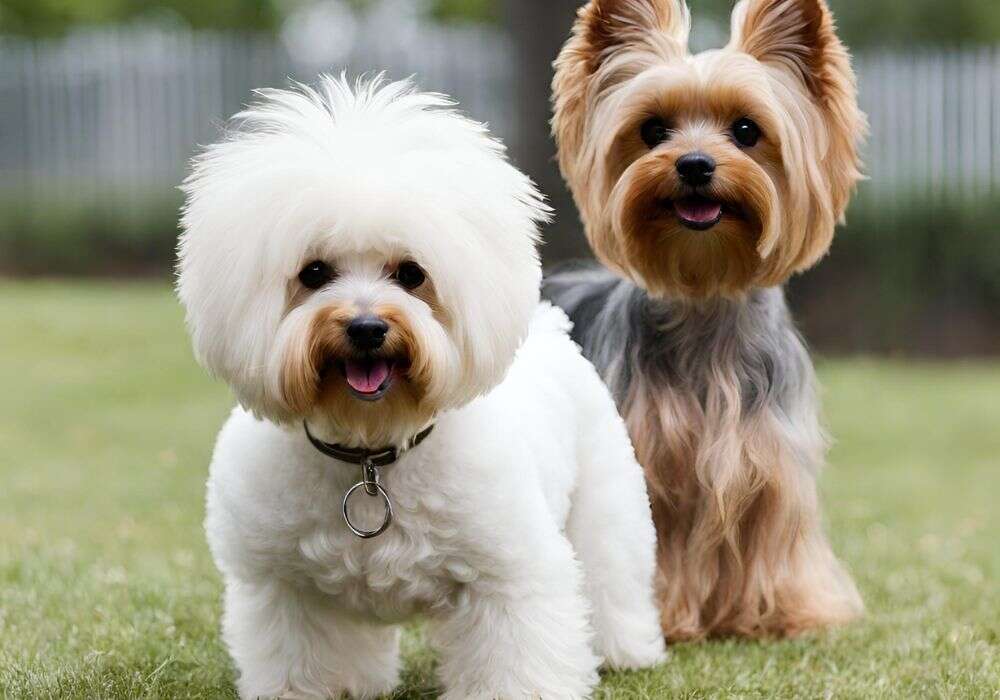Introduction
The Bichon Frise and the Yorkshire Terrier are two popular breeds of dogs that are often compared to each other. Both breeds are small, fluffy, and affectionate, but there are some key differences between them. In this article, we will take a closer look at both breeds and compare them in terms of size, personality, grooming needs, and exercise requirements. We will also discuss which breed is right for you based on your lifestyle and individual needs.
Key Differences Between A Yorkie and a Bichon Frise
| Aspect | Bichon Frise | Yorkie (Yorkshire Terrier) |
|---|---|---|
| Size | ||
| Coat Length | ||
| Temperament | ||
| Life Expectancy | ||
| Health Concerns | ||
| Exercise Needs | ||
| Grooming Needs | ||
| Trainability | ||
| Barking Tendency | ||
| Compatibility with Other Pets |
Bichon Frise Breed Overview
Breed History: The Bichon Frise is a small, white, fluffy dog with a long history. It is believed to have originated in the Mediterranean region, and it was once popular as a lap dog for royalty. Today, the Bichon Frise is still a popular choice for families and individuals alike.
Size: The Bichon Frise is a small dog, typically weighing between 10 and 15 pounds. They are about 10 to 12 inches tall at the shoulder.
Personality: The Bichon Frise is a friendly, playful, and affectionate dog. They are also very intelligent and easy to train. Bichon Frises are good with children and other animals, and they make great companions for people of all ages.
Grooming: The Bichon Frise’s coat is long and silky, and it requires regular brushing and grooming to keep it looking its best. They also shed a moderate amount.
Health Issues: The Bichon Frise is a generally healthy breed, but they can be prone to some health problems, such as patellar luxation, cataracts, and allergies.
Lifespan: The Bichon Frise has a lifespan of 12 to 15 years.
Yorkie Breed Overview
The Yorkshire Terrier, or Yorkie for short, is a small, toy breed of dog. They are known for their long, silky coats and their outgoing, playful personalities.
Size: Yorkies are typically between 7 and 8 inches tall at the shoulder and weigh between 4 and 7 pounds.
Lifespan: The average lifespan of a Yorkie is 12-15 years.
Temperament: Yorkies are typically friendly, outgoing, and playful dogs. They are also intelligent and can be easily trained.
Grooming: Yorkies have long, silky coats that require regular brushing and grooming. They also need to be bathed regularly to keep their coats clean and healthy.
Health Issues: Yorkies tend to be healthy dogs, however they do have certain potential health issues like:
- Lung disease
- Heart disease
- Eye problems
- Dental problems
If you are considering getting a Yorkie, it is important to be aware of these potential health problems so that you can properly care for your dog.
Comparison of Bichon Frise and Yorkie
The Bichon Frise and the Yorkshire Terrier are two popular small dog breeds that are often compared to each other. Both breeds are known for their friendly, playful personalities and their long, silky coats. However, there are some key differences between the two breeds that potential owners should be aware of before making a decision.
Size: The Bichon Frise is a small breed, typically weighing between 10 and 15 pounds. The Yorkshire Terrier is a tiny breed, typically weighing between 4 and 7 pounds.
Coat: The Bichon Frise has a long, silky coat that requires regular brushing and grooming. The Yorkshire Terrier also has a long coat, but it is more wiry and does not require as much grooming.
Temperament: Both the Bichon Frise and the Yorkshire Terrier are friendly, playful breeds that make good companions for families with children. However, the Bichon Frise is typically more outgoing and friendly with strangers, while the Yorkshire Terrier can be more reserved and protective of its family.
Exercise Needs: Both the Bichon Frise and the Yorkshire Terrier are relatively low-maintenance breeds that do not require a lot of exercise. However, both breeds enjoy playing fetch and going for walks, so it is important to make sure they get enough exercise to stay healthy.
Health Issues: Although both the Bichon Frise as well as the Yorkshire Terrier live long and happy lives, they are susceptible to a few common health problems. You should discuss these issues with your vet and take preventative measures.
Ultimately, the best way to decide which breed is right for you is to meet both the Bichon Frise and the Yorkshire Terrier in person. Both breeds are great options for families with children, but the Bichon Frise is typically more outgoing and friendly with strangers, while the Yorkshire Terrier can be more reserved and protective of its family.
Which Breed is Right for You?
Both the Bichon Frise and the Yorkshire Terrier are great breeds of dogs, but there are some key differences between the two that you should consider before making a decision.
Ultimately, the best way to decide which breed is right for you is to meet both breeds in person and see which one you feel a connection with.
Bichon Frise Pros and Cons
Pros:
* Small, gentle, and affectionate
* Easy to train and groom
* Low-maintenance coat
* Good with children and other pets
* Lively and playful
Cons:
* Can be yappy
* May be prone to separation anxiety
* Can be expensive to buy and maintain
* May not be suitable for homes with small children or other pets
Yorkie Pros and Cons
Pros:
- Small and portable
- Friendly and affectionate
- Good with children
- Easy to train
- Low-maintenance coat
Cons:
- Can be yappy
- Prone to some health problems
- Can be expensive to buy and maintain
Cost of Bichon Frise vs Yorkie
The cost of a Bichon Frise or Yorkie can vary depending on a number of factors, including the breeder, the puppy’s age, and the location. However, you can generally expect to pay anywhere from $500 to $2,000 for a Bichon Frise and $600 to $3,000 for a Yorkie.
Here are some of the factors that can affect the cost of a Bichon Frise or Yorkie:
- Breeder: The cost of a Bichon Frise or Yorkie from a reputable breeder will be higher than the cost of a puppy from a backyard breeder or pet store.
- Age: Puppies are typically more expensive than adult dogs.
- Location: The cost of a Bichon Frise or Yorkie can vary depending on where you live.
It is important to remember that the cost of a Bichon Frise or Yorkie is just one factor to consider when choosing a dog. You should also think about the dog’s personality, grooming needs, and exercise requirements to make sure that it is a good fit for your lifestyle.
Where to Buy a Bichon Frise or Yorkie
There are a few different ways to buy a Bichon Frise or Yorkie. You can:
- Buy from a reputable breeder. This is the most reliable method for locating a healthy, well-adjusted puppy. A reputable breeder will be happy to address your concerns and provide you assurance that your new pet will be healthy.
- Adopt from a rescue organization. There are many Bichon Frise and Yorkie rescue organizations in the United States. Adopting a rescue dog is a great way to give a loving home to a dog in need.
- Shop from a reputable pet store. Pet stores can be a good option if you are looking for a specific breed of dog. However, it is important to do your research and make sure that the pet store is reputable. Some pet stores sell puppies from puppy mills, which are often unhealthy and mistreated.
No matter where you choose to buy your Bichon Frise or Yorkie, it is important to do your research and make sure that you are getting a healthy, well-socialized puppy.
FAQs: Bichon Frise vs. Yorkie
1. Which breed is better for families with kids?
Both Bichon Frises and Yorkies can be great with kids when socialized properly. However, Bichons are often more tolerant and less fragile, making them slightly more suited for homes with younger children.
2. How often do they require grooming?
Both breeds have high grooming needs. Bichons have a curly coat that requires regular brushing to prevent matting, while Yorkies have a long, silky coat that needs daily brushing.
3. Are they hypoallergenic?
Yes, both Bichon Frises and Yorkies are considered hypoallergenic breeds, making them suitable for individuals with allergies. However, no breed is completely hypoallergenic, so it’s essential to spend time with the dog before bringing it home if allergies are a concern.
4. Which breed is more trainable?
Both breeds are intelligent, but the Bichon Frise is often considered easier to train due to its eager-to-please nature. Yorkies can be a bit more stubborn, but with consistent training, they can also be well-mannered pets.
5. What are their exercise needs?
While both breeds are active and enjoy playtime, the Bichon Frise may require slightly more exercise than the Yorkie. Regular walks and play sessions are beneficial for both breeds to keep them healthy and mentally stimulated.

As a lifelong dog lover, I fell in love with Yorkies for their spunky personalities, intelligence, and unwavering loyalty.
As a dedicated Yorkie owner, I have spent years learning about the breed and how to provide the best possible care for them. From finding the proper diet to exercise, and so much more! I take every aspect of my Yorkie’s life seriously.
In addition to being a loving dog parent, I’m an avid blogger, sharing my experiences and insights on all things Yorkie-related. From training tips to grooming advice, Yorkieclothing.com is a go-to resource for other Yorkie owners worldwide.




